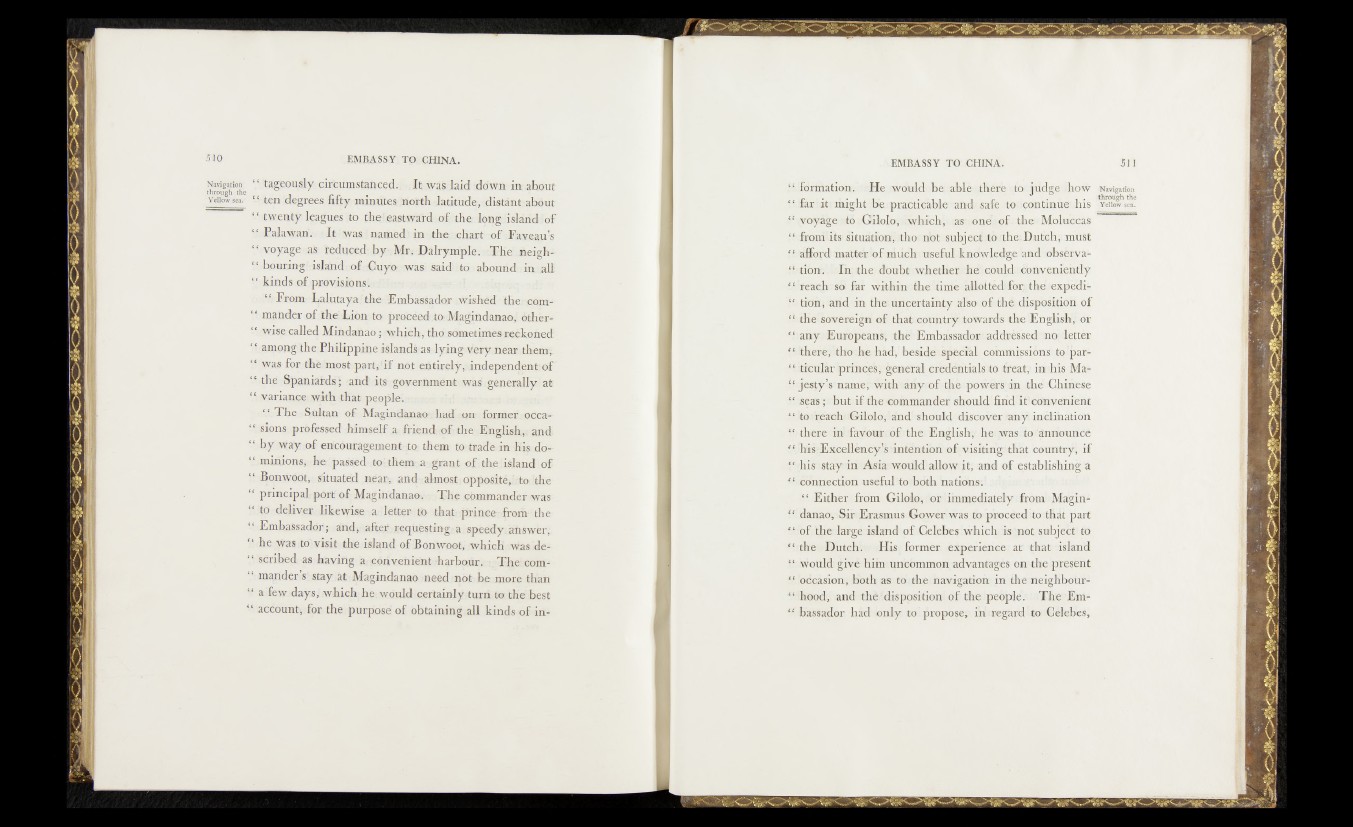
N^igartQh “ ;tageou,sly. cirpumstahced.j , It; WasJaid rddwh in ahriut through.-the YeUoW:S6av ‘-V.ten degrees fifty mintttes „“north latitude, distant abdut
‘-‘/twenty leagues ito thef.eastw^rd of the.lo.ng';isHri,d f(d'
Palawan. I t1 was. named; in the, diart of Fav.eau%
“• voyage-as fednspAifey;. Mr. Dahymple. The meigh-^
“ bouring island of Cuyo was? said' to I abonhd in alf
“ kinds ©f provisions. I
“ From I^alutaya/tiie.'Embassaclctr .wished tbereom--
“ mander of the Lion to pi«®^j^ite8-Magindana®^ other-
“ wise called Mindanao ;-which, thd.s6fnetim.es reckoned:
“ among the,PhiHppine islandkas; lying'Very near them*;
“ was for the'most part;'if not entirely, independent;of
‘‘ the Spaniafdsj -and1 its government was' , generally - at
“ wariansi with that peapiei;?:?.
“ . The Sultan of Magindanao- had „sob former , oeca-
‘4 ismnsoprolessed Mmseff auIriendj£o|tthe-J^gEsh*{ and
“ by way cof encouragement to them tBtEade in-h'ffdd^
minmns,pheipa^dttoi them- aagranfe o f: the;island dff
“ Bonwdot,, situated .»ear-, and -almost, opposite; . to? The
“ principal port of Magihdana©/: The «ommaader was
“ to ddiYeadifeewise: -wdetter tlb thafi-p>ineei;|r<Mhi; the:
“ Emha&sadpr; and, afteij;requesting?.a /speedy! ariswer;
he was to visit the island of.Bon woot, which was de-
‘ ‘ scribed as having a -cdhvehient harbo.ur. : Tfie com-
mander?sfcstay,-at. Magindanao -need .mote he. more than
1 a fbw;days jwhich; he. would certainly tuni tm thdihest
4‘ accounts :for the purpose of obtaining all kinds o f inj'formation.;|
He would beaAl©fih?ph\to(; #a*%aain
far-it; mighteHe-practisalaiemnidtpsafe to .continue; his
/veyagerto. G’ilolot;iwhich; -as*,one7; oh the Moluccas
fronilits' situation,'Jthonnht?suhjec^thfthe;Dui3Gh; mutt
^fiordmattekrofjiidddh'-ttsefohkn'^lwledgeihfijtl »bsferva4-
jmmK I Ih| the; Amïwliwhethep^ti coulddïlbwv.exilehfi^y
beach s® far within fheitxm'e allotted; for^thri^eripedif-
tiöri; arid in the uncertainty a&ouerfkthg-.disposition of
the-sovereign; of that-epuntrijhtpwards t-be lEngli'shv or
any Europeans, the'• Embassador«taddr.êssedt' -no lettér
there, tho he had, beside special cómmissièffls)tpl|ia#-
ititolar iprinqpft ggaei^J éri^iriiialssto 8§)<ÉÉs amtshisi Maf-
j.esty’s“name-uWith.ariy?j0f;thêjpowtëks'èm. thëChinese
•seas;- but*iftfjhjc'ecfinmander should firidri<3caMvenieht
■to'fceacbriGilolo, I-a’nd ;s houM discover "anyi inclihaitiori
> there in rfaybur c@f; the English;' he - was do ^ènriouncë
h*M^Elm®llë®cylfei»Sntiririi®fv visiirinjgjthht cattlïfiïylf if
/hisistaytin Asia'would) allow it; and of est&bMsIting ‘a
Connection useful to both 'natidhsd ar
“ Either from Gilolo, -on'iinmedlately. from* >Ma)giii-
danao, Sir Erasmus Gower was to-proceed totalt part
oftherdaigè island of Celebes whichisg®ètsubj.eott tri
the Dutch. His former experience« at that island
. iviould' give hiin -uncommon advantages on the .-present
hripasion, both as tobthe riavigatóori in the ^igfih A i-
hood, and thé /dispositions of the ;peo|rië.' The- Embassador
had only to propose; iWiregardito '©éluÜës;